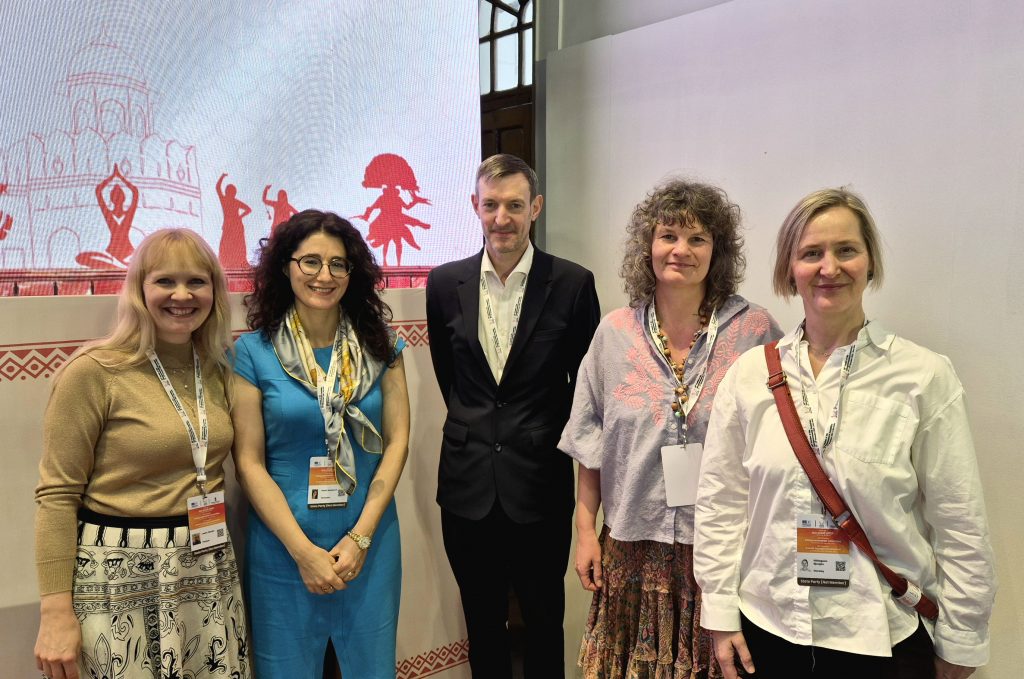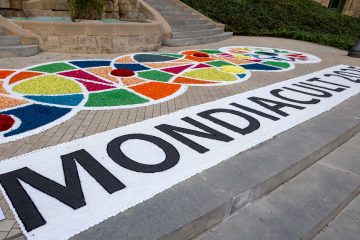The Steering Committee plays a central role within the Network, overseeing its activities, organising meetings, facilitating communication and acting as an essential link between the Network and the Secretariat of the 2003 Convention. From the outset, members have opted for an informal approach in order to encourage fluid exchanges and collective dynamism. Based on this successful model, this approach has been maintained over the years.
In 2021, a group of 9 people was formed to coordinate the network’s activities. After three years of fruitful collaboration, it was time to renew or confirm the roles within the Steering Committee.
Election process of the ENFP Steering Committee
The process of renewing the Steering Committee began in April 2024 with a call for volunteers to establish a clear and transparent election procedure. After several discussions, a first document was drafted in July, aiming to maintain the network’s informal approach while introducing flexible guidelines. The objective was to strengthen the democratic spirit of the network while clarifying the roles and missions of the committee. This proposal was shared with members in August 2024, who were invited to provide feedback and submit their candidacies by October 31 to ensure a transition at the beginning of 2025. At the end of this process, six members presented their candidacies: four for re-election and two for a first term.
The Steering Committee election was conducted via the secure platform Election Buddy, widely used by international organizations to ensure an anonymous and reliable voting process. This platform allowed focal points, facilitators, and researchers from Electoral Groups I and II to participate in the vote, which ended on Monday, January 13, 2025, with a 43% participation rate (52 votes out of 121). The electoral process was open and transparent, with clear communication regarding deadlines and voting procedures.
At the end of the vote, all candidates were approved by the network members!

Meet the members of the Steering Committee!
Ioana Baskerville (Focal point - Romania)
Ioana Baskerville is Romania’s national focal point for the 2003 UNESCO Convention, designated by the Ministry of Culture of Romania since 2020. She has coordinated several multinational files for Romania’s Representative List and is also a trained member of the Global Network of Facilitators for the 2003 UNESCO Convention. However, she considers herself first and foremost a researcher in ethnology and cultural anthropology, a role she has held since 2006. Her research interests include the anthropology of religion and spirituality, migration studies, heritage education, social and cultural aspects of environmental sustainability, and the anthropology of pastoralism. Ioana enjoys serving as a contact point for grassroots heritage communities, helping them engage with institutions and administrations through participatory governance and community-driven safeguarding projects. As such, her work primarily focuses on cultural mediation and facilitation within multi-stakeholder contexts.
Hildegunn Bjørgen (Focal point - Norway)
Hildegunn Bjorgen leads the work with the UNESCO Convention for Safeguarding the Intangible Cultural Heritage (2003 Convention) in Arts and Culture Norway. The directorate is the Focal Point to the 2003 Convention in Norway. In accordance with the Norwegian policy in the work on the implementation of the 2003 Convention, Hildegunn Bjorgen works to ensure a wide-ranging participation of different stakeholders who create, maintain, and transmit cultural heritage in Norway. In accordance with the Norwegian policy in the work on the implementation of the 2003 Convention, she works especially with Sami communities and the national minorities in Norway.
Phil Foxwood (Focal point - United Kingdom)
Phil is a civil servant at the Department for Culture, Media and Sport in the UK Government and has been Head of World and Living Heritage for the past 3-4 years. In this time, he has built support and taken through the UK’s ratification of the 2003 Convention and is now leading implementation and the creation of inventories in the UK with his colleague August.
For World Heritage he led the UK review of the Tentative List and leads on World Heritage Committee engagement alongside the Government’s heritage advisers Historic England.
He previously worked on fiscal events in the department and prior to this worked on a large online film archive project at the British Film Institute. His background is in film exhibition, and he lives by the seaside (and the channel tunnel!) in Folkestone.
Leena Marsio (Focal point - Finland)
Leena is a Senior Advisor at the Finnish Heritage Agency, where she has coordinated the UNESCO 2003 Convention in Finland since 2014. Over the years, she has worked with the Wiki-inventory of Living Heritage, collaborating with hundreds of ICH communities and managing several submissions to UNESCO’s ICH list. Leena is actively involved in international initiatives, including Wiki Loves Living Heritage (2023) and the LIVIND project (2021-2024), which focused on integrating ICH with sustainability. Additionally, she has served as the national coordinator for the European Heritage Label since 2018.
Leena holds a Master’s degree in Arts Management from the Sibelius Academy and a Bachelor’s degree in Arts Research from the University of Helsinki. Before her government career, she spent a decade as a freelance researcher and producer in various arts and culture organizations, including governmental bodies, NGOs, and private companies.
Jorijn Neyrinck (Facilitator - Belgium)
Jorijn Neyrinck is a cultural anthropologist. She is the coordinator of the NGO Workshop intangible heritage in Belgium, trained facilitator in the UNESCO 2003 Convention’s network of facilitators for the Global Capacity Building Programme, Steering member of the European Network of Focal Points for the UNESCO 2003 Convention (since 2021), and vice-chair of the Flemish UNESCO Commission.
She also served as an advisory member in the Evaluation Body of the UNESCO 2003 Convention (2019-2022). Jorijn takes on a cultural broker role in the field between ICH actors, governments, civil society, and academia. Some of her other recent initiatives and commitments are: lead for the ICH and Museums Project (IMP), partnership in the European Living Heritage Journeys project, coordinator of the international working group and webdossier ICH and sustainable tourism, and co-organizer for Wiki Loves Living Heritage (2023).
Nikolai Vukov (Facilitator - Bulgaria)
Nikolai Vukov is anthropologist and historian, currently the Head of the Department “Anthropology of Verbal Traditions” at the Institute of Ethnology and Folklore Studies with Ethnographic Museum – Bulgarian Academy of Sciences. He has been trained as facilitator for 2003 UNESCO Convention and is a member of the Global Network of Facilitators. In 2014-2017 he served as Representative of the Republic of Bulgaria at the Intergovernmental Committee for the Safeguarding of ICH. Nikolai has participated as facilitator in training workshops for UNESCO in Europe and Central Asia, and has carried out needs assessment surveys for ICH safeguarding in countries like Albania, Moldova, and Bosnia and Herzegovina, among others. As a researcher, his interests are related to verbal traditions, epic singing, storytelling practices, cultural heritage in immigration, commemorative rituals, ICH safeguarding in armed conflicts, memory and heritage landscapes.


